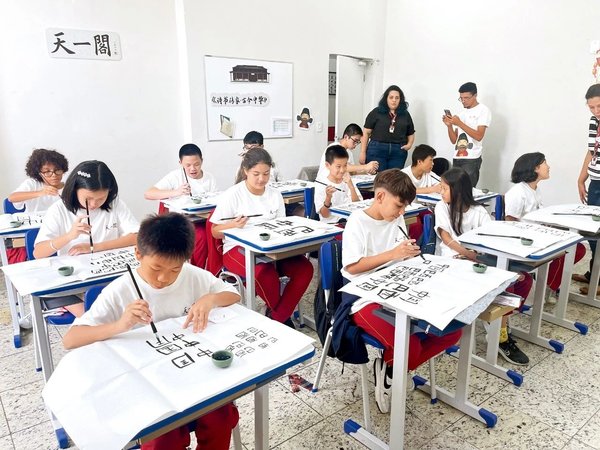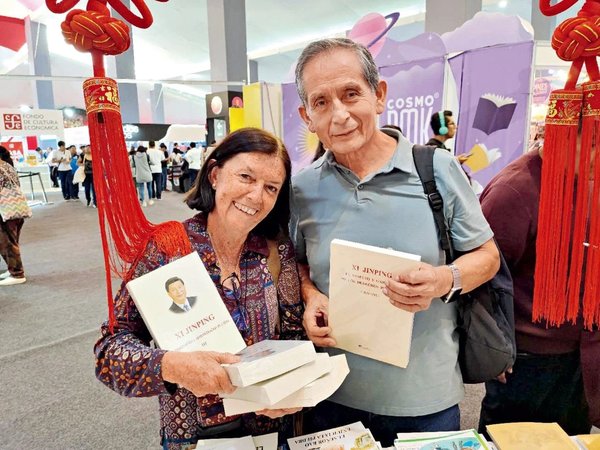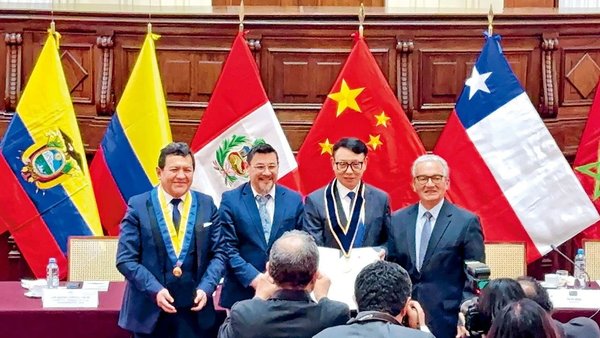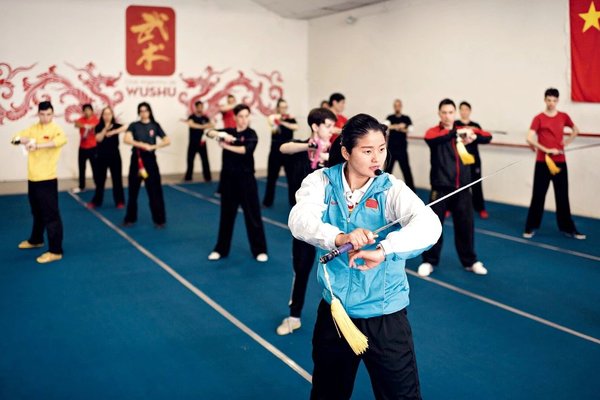My Chinese Heart | Overseas Chinese Contributing to China-Latin America Cultural Exchanges
Cultural and people-to-people exchanges and cooperation have deepened between China and Latin American countries in recent years. In fact, solid progress has been made through those exchanges, and, coincidentally, a bridge of friendship has been built across the Pacific Ocean. Overseas Chinese have played important roles in this process. From running Chinese-language schools to promoting Chinese publications and teaching Chinese martial arts, overseas Chinese have helped inject momentum into the boom of Chinese culture in Latin American countries.

Brazilians Learning Chinese
During a recently concluded Chinese calligraphy contest, commemorating International Chinese Language Day, at an international Chinese-language school in Rio de Janeiro, capital of Brazil, a group of children, from different ethnic groups and countries, concentrated on a Chinese poem from the Tang Dynasty (618-907).
The school, the first full-time Chinese-language school in a Latin American country, was established in 2019. The school is funded by overseas Chinese, and by Chinese enterprises in Brazil.
At present, the school has 82 students, more than half of whom are from overseas Chinese families. The remaining students are from Brazil or other countries or regions.
"The school has adopted the Chinese, English and Portuguese languages in its teaching, and the school has been included in the local public education system. Chinese education is one of the major focuses, and the school uses China's compulsory-education textbooks in the Chinese language and mathematics," notes Zheng Maoxia, chairman of the school board.
Maria, from Portugal, has studied the Chinese language at the school for more than three years. In addition to learning to speak Chinese, fluently, she has gained a deeper understanding of traditional Chinese culture, and she has shown great interest in furthering her education in China. Influenced by their daughter, Maria's parents have enrolled in the Chinese class for parents, and they have performed well in the course.
"The school organizes various activities regularly, such as calligraphy and tea classes, and contests centered on Chinese characters. The Chinese-language and -culture classes for parents are also popular. The school also holds celebrations to commemorate traditional Chinese festivals, including Spring Festival, Dragon Boat Festival and the Mid-Autumn Festival," Zheng says.
Coinciding with the in-depth development of China-Latin-America relations, Chinese-language fever has heated up in Latin American countries in recent years.
In March 2022, the Legislative Assembly passed a bill that designated September 28, also known as Confucius' birthday, as International Chinese Language Day. The bill also enshrined the day as one of Brazil's official festivals.
"A rising number of Brazilian students, and their parents, have shown an interest in learning the Chinese language, and they have paid close attention to China's economic and social development. The school has recruited more students from different countries," Zheng says.
The past year, 2024, marked the 50th anniversary of China-Brazil diplomatic ties, and a wide range of Chinese cultural activities were held at the school to celebrate the anniversary. The long-prepared Chinese Culture Week was held in December. More than 10 teachers from China were invited to teach students about China's ethnic dances, martial arts, poetry recitation and painting during the event. Children from other schools were also allowed to participate in Chinese Culture Week.
"Overseas Chinese have become a bridge of cultural exchanges between China and Brazil," Zheng says. The school, he adds, will do its utmost to promote the Chinese language and culture in Brazil, and to encourage students, from different countries, to communicate with each other, establish friendships, and contribute to multicultural exchanges and integration.

Understanding China, Through Books
In August 2024, Meng Kexin, editor-in-chief of La Voz de La Colonia China, a Chinese-language newspaper in Peru, attended the launch of his book, Cuando China se encuentra con el Perú. The event was held in Congress Palace of the Republic of Peru.
The book's Spanish edition was well received by Gustavo Pacheco Villar, President of the Andean Parliament, and other senior Peruvian congressmen.
Pacheco said Meng's book introduced Peru, from a Chinese perspective, and helped shorten the distance between Peru and China. Publishing the book before the 31st APEC Economic Leaders' Meeting (held in Lima, Peru, in November 2024), Pacheco added, reflected the strengthening of cultural exchanges between the two countries.
"The book covers the stories of overseas Chinese, the emergence of China fever, the business development of Chinese enterprises in Peru, as well as the Peruvian landscape and customs. The first printing of 1,200 copies sold out quickly. I deeply feel the eagerness of Chinese and Peruvian people to deepen mutual understanding, and to enhance cultural exchanges," Meng says.
 |
| Meng Kexin (second from right) |
During recent years, Meng has participated in various book fairs, in Peru and other Latin American countries, and he has cooperated with Chinese publishers to promote Chinese books among Latin American readers.
During the 28th Lima International Book Fair, held in July and August 2024, a Peruvian reader bought 35 China-related books at Meng's booth. That left a deep impression on Meng.
"The past few years have witnessed a rising number of Chinese publications, and the attendance of more and more Chinese exhibitors, at the Lima International Book Fair. The China booth is one of the hottest booths every year, and people want to learn more about China through Chinese publications," Meng says. The Spanish version of Xi Jinping: The Governance of China has been a big seller (having sold thousands of copies) during book fairs, Meng adds.
Audio-video and digital publications of classical Chinese literature, and of works dealing with traditional Chinese culture, have become popular with people in Latin American countries, Meng adds.
Meng, who has been living in Peru for more than 20 years, has been working hard to promote cultural exchanges between China and Peru. For example, in La Voz de La Colonia China, he has published many reports on projects that have been implemented by China and Peru under the China-proposed Belt and Road Initiative (BRI).
In addition, Meng has played a positive role in organizing tours aimed at fostering mutual learning between the civilizations of China and Latin America. He also established the Peru Chinese Cultural Experience Center, and he has organized various cultural-exchange activities.
"Enhancing cultural exchanges is long-term work. Every overseas Chinese can become a narrator of China's stories, and a promoter of China-Peru friendship," Meng says.
Promoting Chinese Martial Arts
Chen Min, a Chinese martial-arts instructor, runs a martial-arts club with her husband, Hong Wenwu, in Buenos Aires, capital of Argentina.
Chen was born in Taizhou, a city in east China's Zhejiang Province. She began studying martial arts when she was 5. When she was 9, she became the youngest member of the provincial martial-arts team. She won several championships during national games, and during East Asian Games.
She moved to Argentina in 2007, after she retired from competition. The next year, she and Hong opened Argentina Citizens Martial Arts Club, to promote traditional Chinese martial-arts culture in Argentina. Hong, a second generation overseas Chinese in Argentina, is also a retired martial-arts athlete. He was once a member of Argentina's martial-arts team, and he once won the Pan American martial-arts championship.
Their club has four locations. "We have reached an agreement with the Club Atlético River Plate, a famous football club in Argentina, over the building of our fifth site," Chen says.
With the current four sites combined, the club has nearly 500 students, ranging in age from 4 to 80-plus. The students have become deeply influenced and motivated by the spirit of Chinese martial arts.
One 13-year-old Argentinian boy, named Marco, has studied martial arts under Chen for eight years. The once-rebellious boy has grown into a highly responsible and disciplined teenager since he began studying martial arts.
Another Argentinian, a woman battling cancer, has also studied martial arts at the club for eight years. She said her love for Chinese martial arts, and the support of her coaches and classmates, has given her additional strength and courage to fight the disease.
"Chinese martial arts embody a harmonious way of life. This was the slogan we put forward when we established the club," Chen says. Martial arts have become an important carrier of traditional Chinese culture, she adds. Chen has integrated the wisdom of Chinese philosophy with the teaching of Chinese martial arts. In addition to guiding the students' movements, Chen explains to them the balance of yin and yang, the unity of knowledge and action, and other relevant thoughts.
 |
| Chen Min (front) |
Not long ago, the Argentina National Association of Martial Arts Clubs, which was established by Chen and Hong, hosted the 2024 international martial-arts contest, in the stadium of the Club Atlético River Plate. The event attracted nearly 300 martial-arts enthusiasts from 12 countries or regions.
Chen has been dedicated to promoting martial arts, and its culture, for the past several decades. She has established free online courses, to guide netizens in practicing martial arts, and she has worked with the government of Luján (a city in Argentina) to organize Chinese cultural festivals. Also, she has organized and hosted international martial-arts contests, and arranged for Argentinian martial-arts enthusiasts to visit China.
"When the club was established, I hoped all of my students would become professional athletes. Now, my mindset has changed. In future, I will strive to promote Chinese martial arts in the lives of more Argentinian people, so the rich culture contained in martial arts will become more deeply rooted in people's hearts," Chen says.
Photos from Interviewees
(Women of China English Monthly January 2025)
Editor: Wang Shasha
Please understand that womenofchina.cn,a non-profit, information-communication website, cannot reach every writer before using articles and images. For copyright issues, please contact us by emailing: website@womenofchina.cn. The articles published and opinions expressed on this website represent the opinions of writers and are not necessarily shared by womenofchina.cn.








.jpg)

 WeChat
WeChat Weibo
Weibo 京公网安备 11010102004314号
京公网安备 11010102004314号